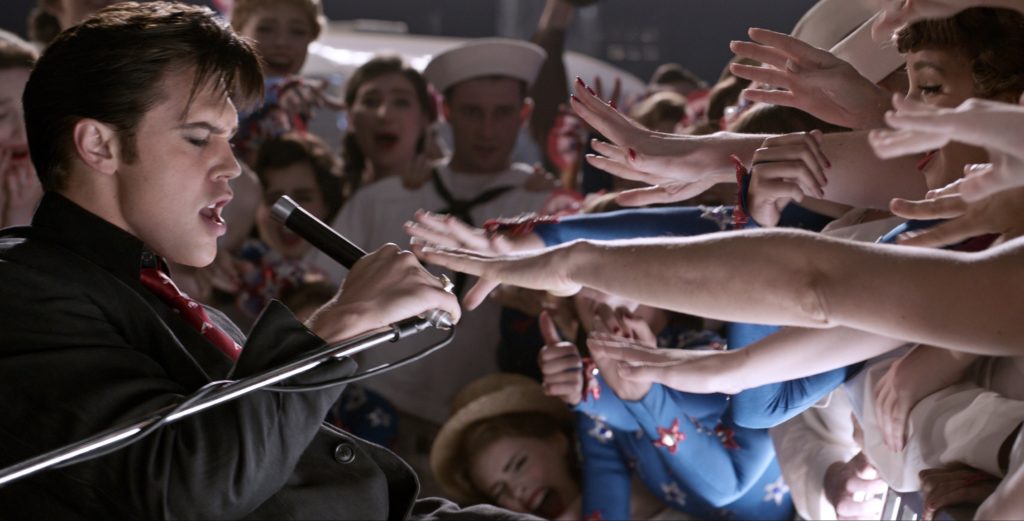Baz Luhrmann is back in cinema after almost a decade. He is doing so with Elvis, about the life of Elvis Presley as seen from his complicated relationship with his mysterious manager Tom Parker (Tom Hanks). But Luhrmann - of course - makes it anything but a cliché biopic. He himself calls it his 'Apocalypse Now'. GW spoke exclusively to Austin Butler, who takes on the role of Elvis.
Text Jorrit Niels Photography Eric Ray Davidson for Warner Bros. Pictures
Whether it was the 'Apocalypse Now of music films' will be, that remains to be seen, but the single scenes we were allowed to see before the interview bode well. After a Baz Luhrmann-less decade without a new feature film, the last being The Great Gatsby from 2013 that won two Oscars, the 59-year-old Australian director is back.
Luhrmann is lord and master at completely reinventing familiar subjects. So again, think flamboyant visuals and quick edits in an 'opera in three acts'. Elvis is played by the relatively unknown Austin Butler (aged 30).
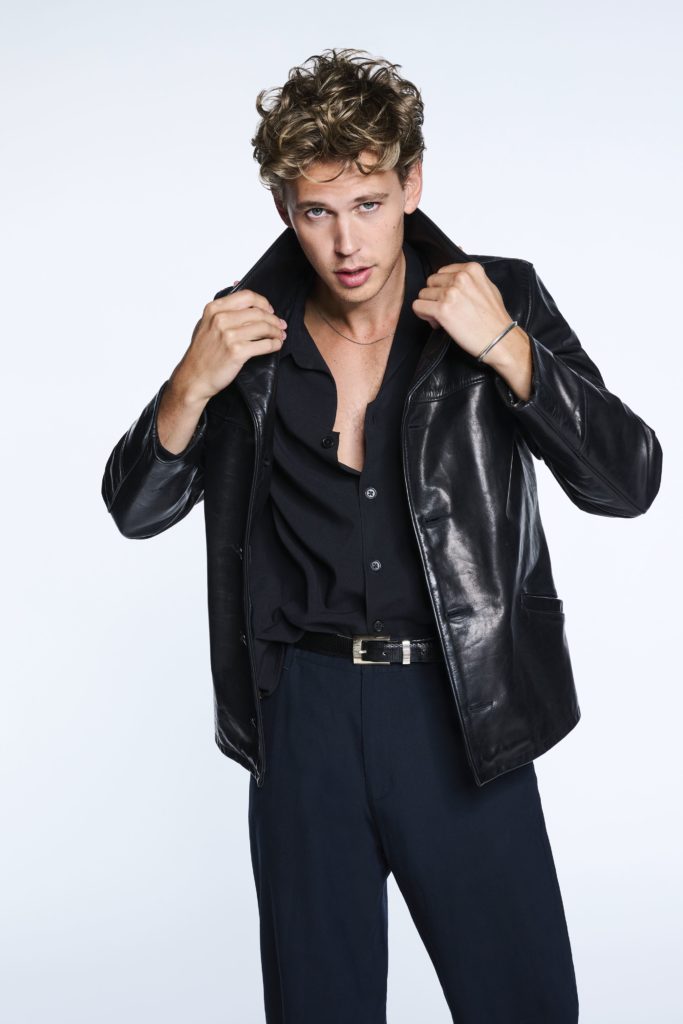 After some roles in interchangeable (teenage) series as a generic heartthrob, he particularly caught our eye as Manson member Tex Watson in Quentin Tarantino's Once Upon a Time in Hollywood. Outside of that, he was on stage a lot and won't be off your screen for the next few years. Because in addition to Elvis will we see him soon in HBO's Band of Brothers-successor Masters of the Air, set around the Battle of Britain. And has a role to play in Denis Villeneuve's Dune: Part Two.
After some roles in interchangeable (teenage) series as a generic heartthrob, he particularly caught our eye as Manson member Tex Watson in Quentin Tarantino's Once Upon a Time in Hollywood. Outside of that, he was on stage a lot and won't be off your screen for the next few years. Because in addition to Elvis will we see him soon in HBO's Band of Brothers-successor Masters of the Air, set around the Battle of Britain. And has a role to play in Denis Villeneuve's Dune: Part Two.
In love with acting
Quite a change with how Butler started as an extra at 13e. "Working as an extra helped me feel comfortable during my childhood. Like Elvis, I was a very, very shy child. On a set with other kids, there was no hierarchy, which can sometimes be there in normal life. That taught me a lot about how I want to behave in any environment.
Only when I started taking acting classes did I learn that it was a craft. I fell in love with it. However, it took a long time before I could do what I dreamed of. Slowly and carefully, I started moving in the direction of what I wanted as an actor. The Iceman Cometh on Broadway -alongside Denzel Washington- and Quentin Tarantino were emotionally very demanding. Certainly Iceman was like climbing Everest for me."
Denzel Washington, incidentally, is a major factor behind why Butler now sits opposite us. Washington personally called Baz Luhrmann to recommend Butler. Successfully, because a few years later he found himself opposite screen partner Tom Hanks playing Elvis' manager Colonel Tom Parker. "That was unreal," Butler explains. "You hear it more often, but the man is a king. He immediately gave me a huge hug and made me feel safe. We filmed this movie in Australia and stayed in the same hotel for a while. Hanks is an avid lover of typewriters and one day I got a typed letter shoved under my room door. A letter from Hanks as Tom Parker. In front of the door was also a typewriter. I wrote him a letter back as Elvis and so we exchanged several letters. The best preparation I could have wished for. I will keep them forever."
What did you learn from Hanks?
"Tom Hanks knows better than anyone how to lose yourself in big films.I think he saw that I was too absorbed in the role and gave me some advice: do one thing a day that has nothing to do with work. Making a film, especially this one, is an all-consuming and relentless marathon. The body and psyche are taxed heavily, so you benefit from a daily diversions. Watch a film you've never seen before. A trip to that mountain in the distance. Something other than the reel. You see a lot of people, whether in the film industry or any industry, who are completely jaded after a while. I hope Tom has prevented that from happening to me in the long run."
It took three years from casting to film, what was that like?
"Nerve-wracking, because the longer you have, the more often you doubt your choices. I was 27 when I was cast and am now 30. The hardest part was the fact that he is such an icon. And there was that Elvis with the almost god-like status and the Elvis as kitsch artist. I wanted to look for his humanity and give you a picture of what the man was really like. Not how you know him from stories and TV appearances. It's very easy to fall into a caricature."
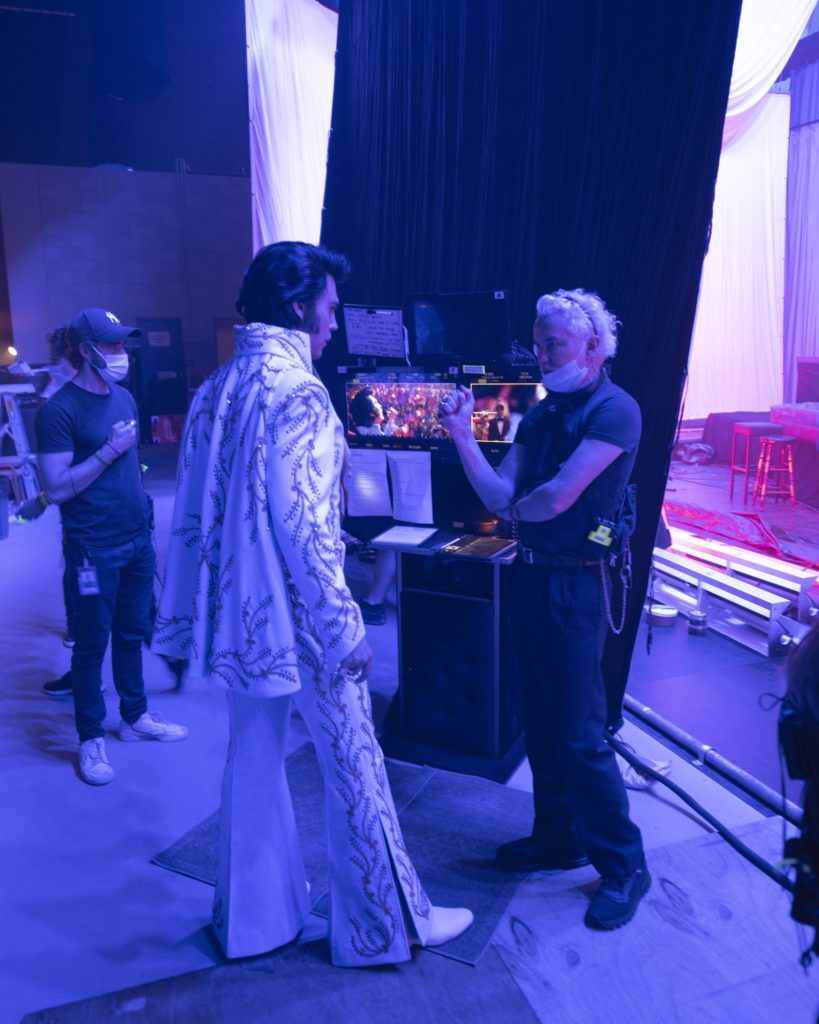
So how do you start?
"By absorbing as much as possible. Fortunately, there is an endless sea of information and material about his life. I watched every documentary about him, read every book I could find, listened to interviews and heard private recordings of phone calls. Those phone calls, which had been recorded by an ex, were particularly fascinating. That spontaneity was great to hear. You can hear him slowly getting angry there, being accused of cheating. A rare insight, where 'ordinary interviews' are dwarfed."
You will have an interview persona of your own.
"Of course, I still put on my interview face during this conversation. I am honest, but I don't talk to you like I talk to my girlfriend. That's also why those private recordings allowed me to get so close to his humanity, because I could combine it with how he was towards the outside world. I combined that with dialect and vocal coaches. After all, everything from the 'young Elvis' I sing myself. Hours and hours I spent recording myself and changing the voice to get everything just right. Like it was about a radio and the right frequency."
Do you always set that bar so high for yourself?
"If it's the right role, definitely. With Tarantino, I did the same thing. I was given the special opportunity to play Elvis, so I want it to impress no matter how you feel about him. From how I look, talk, sing to my movements. That's why I used movement coach Polly Bennett, who helped Rami Malek in his role in Bohemian Rhapsody as Freddie Mercury. Before that, I took the wrong approach. I tried to copy Elvis, she told me it had to come from within myself to understand why he moved like that. Insanely, sometimes we were working until three in the morning to get a run right. So that it looks spontaneous and not rehearsed. Sometimes it will be less successful and sometimes flawless; I hope the whole thing will make people proud later."
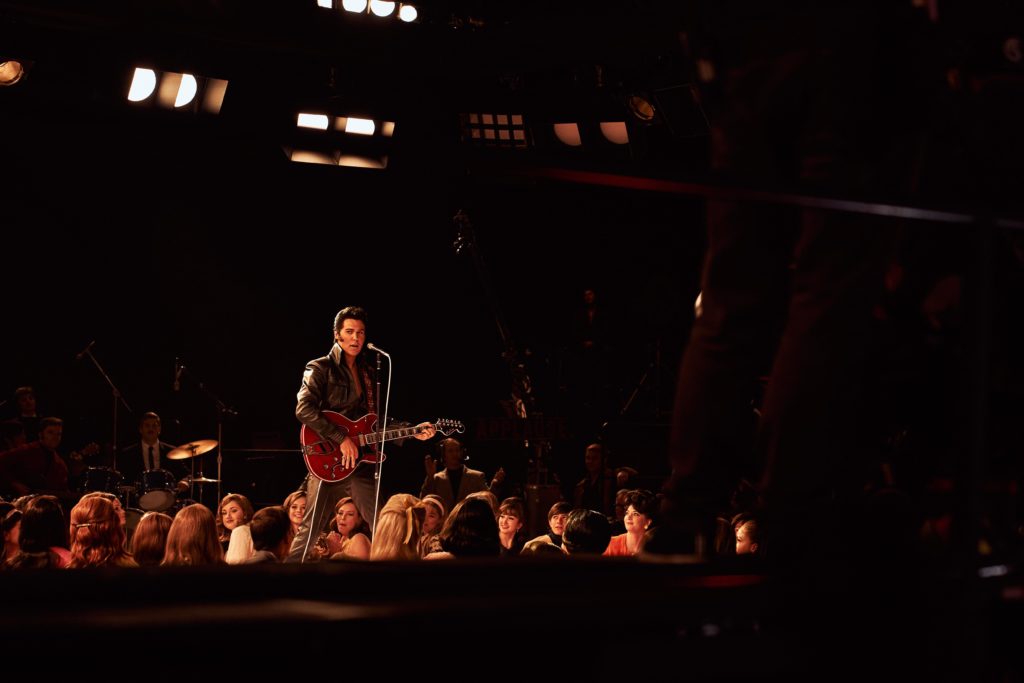 Sounds impressive.
Sounds impressive.
"That was hugely scary. Playing such a famous person, terrifying! Fortunately, I know the family and Priscilla Presley have seen the film and are immensely happy with the result. Thank God, haha. I heaved a sigh of relief. With a film like this, you are very close to a little boy imitating someone in his father's suit, you see? I'm pretty shy in my own right, so how on earth do I go on stage in front of 500 extras? It helped that I knew Elvis was also shy. Those keys to his personality helped me play him. Take, for example, the fact that he lost his mother at 23ste, so did I. Little key moments that helped me feel closer to him. Even if it was exciting at all to be on such a huge set, and then also one by Baz Luhrmann."
As a director, what sets him apart from the rest?
"A tremendous and unique energy. He is a curious man and director who is open to ideas. I wouldn't have immediately thought that in someone of his stature. He involves others and has respect for everyone on his set. From the actors to the extras, I sometimes see that differently."
A big film, an expensive film, AND the lead role. How do you deal with that pressure?
"The pressure has never been so great. Firstly, because I want to do justice to him. I want to do justice to his family and the countless fans. From the moment I had the role, I woke up with a pounding heart. Every morning. Like I had to enter the battlefield. That's quite tiring."
Did that feeling ebb away?
(Laughs) "No, but I wanted to, because it became unworkable at one point. So I started thinking of it as 'free energy'. Turning fear of death into free energy. Easier said than done, but instead of nervously twiddling my thumbs, I started the morning with an Elvis movie. I set up an interview. But... on set, that feeling was there too."
Where there is no room for agony.
"Anything but. I distinctly remember having to go on stage for the 1968 TV special, in black leather. We filmed that first and it felt like a make-or-break moment in my life, my career and for film. I doubted I could really overcome that fear. Then I realised that that TV special was also crucial for Elvis at the time. If he failed, his career was over. Only then did I allow that fear. It was allowed, you can work through that. What do you do? You go on stage and you try to touch the audience. There was one particular moment when it clicked. I felt an interaction with the audience and I allowed myself to think for a moment that it was 1968 and I was making that TV special. That I see that girl blushing, that boy screaming. Once back in 'his' dressing room, indistinguishable from the real thing, I was sweating profusely and looked at myself in the mirror. It was silent and I thought of how he also experienced that moment. That caused a turnaround. I felt like I could do it."
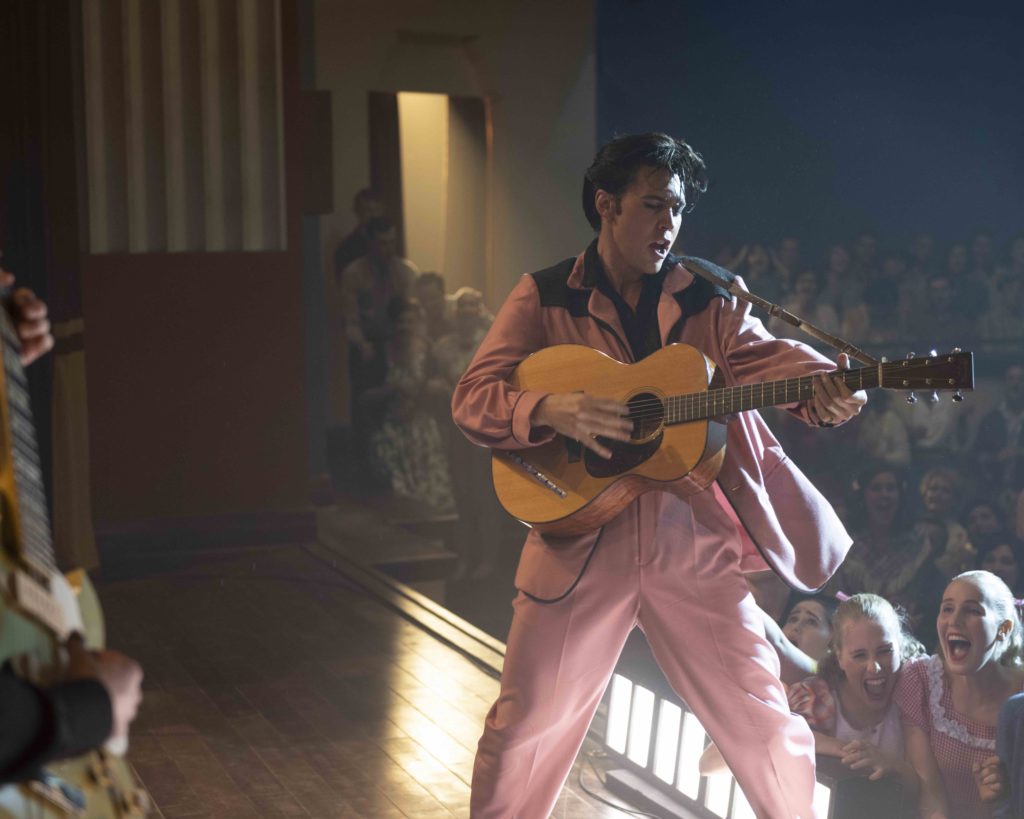 According to Luhrmann, the film is about Elvis, but also about America as a country. What do you think it says?
According to Luhrmann, the film is about Elvis, but also about America as a country. What do you think it says?
"We cover 42 years in one film. From World War II to segregation and the 70s. The US went through a lot in those decades. I like that we also show Elvis' love for black music. And that it's tragic that black artists at the time didn't get the credit they deserved. I hope this film helps to ensure that they do. We also touch on sexuality, something that was ignited in a young generation of women that wasn't there before. We wanted to tell a story about America in which Elvis jumped over that wall of two Americas during the emerging civil rights movement. The life of Elvis Presley is the best canvas to explore America during those years."
What do you hope people pick up from the film?
"The film is neither biopic nor musical in the traditional sense, but rather an impressionistic tapestry. In which one man is used to explore deeper truths about the United States. There are three Elvises, in the 50s, 60s and 70s. Each time he reinvented himself, because he was always searching for himself. Elvis was at the centre of culture in different ways for the good, the bad and the ugly."
Do you think the film helps introduce Elvis to a new generation?
"I hope so. I was hugely surprised to hear that a lot of young people don't actually know him. Or that they only know one of his songs at most. I met a boy who had never heard of Blue Suede Shoes had heard!? You take for granted that everyone knows him, so I hope this opens a door for a lot of people."



